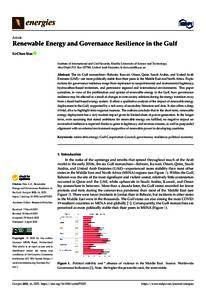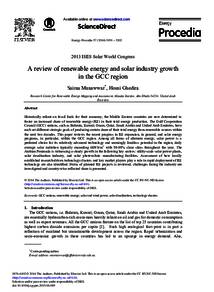Document
Renewable energy and governance resilience in the Gulf.
Publisher
Energies.
Gregorian
2023-04
Language
English
English abstract
Abstract: The six Gulf monarchies—Bahrain, Kuwait, Oman, Qatar, Saudi Arabia, and United Arab
Emirates (UAE)—are more politically stable than their peers in the Middle East and North Africa. Expla nations for governance resilience range from repression to neopatrimonial and instrumental legitimacy,
hydrocarbon-based rentierism, and permissive regional and international environments. This paper
considers, in view of the proliferation and uptake of renewable energy in the Gulf, how governance
resilience may be affected as a result of changes in state-society relations during the energy transition away
from a fossil-fuel-based energy system. It offers a qualitative analysis of the impact of renewable energy
deployment in the Gulf, supported by a rich array of secondary literature and data. It also offers a deep,
if brief, dive to highlight intra-regional nuances. The authors conclude that in the short term, renewable
energy deployment has a very modest impact given its limited share of power generation. In the longer
term, even assuming that stated ambitions for renewable energy are fulfilled, no negative impact on
monarchial resilience is expected thanks to gains in legitimacy and revenue streams, as well as purposeful
alignment with an external environment supportive of renewable power in developing countries.
Member of
Category
Journal articles


